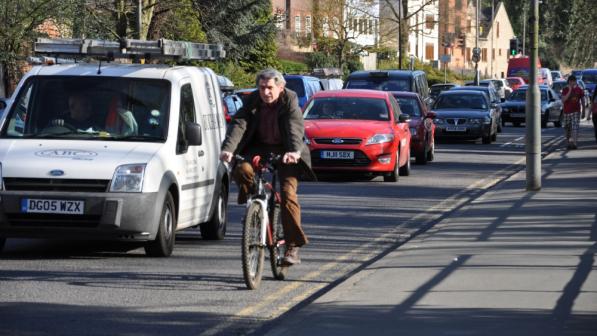Space for cycling will improve rush hour traffic flow

Cycling UK yesterday (Monday, 27 February) explained to MPs how cycle provision makes better use of road space in our towns and cities, enabling more people to get around safely and easily while reducing motor traffic volumes and pollution.
Giving evidence to the Commons Transport Select Committee’s inquiry on urban congestion, Cycling UK’s Policy Director Roger Geffen MBE outlined how creating space for cycling made our city streets more efficient, allowing people to travel more swiftly and safely without depending on motor vehicles. This in turn would bring additional benefits such as cleaner air, improved physical and mental wellbeing, safer streets and town centres that attract people and businesses alike.
Geffen explained that new cycle facilities might sometimes result in short-term localised increases in journey times for those still using those streets in motor vehicles, as had happened on London’s East–West Cycle Super Highway. However this would disappear in time, while the benefits would be an overall reduction of motor traffic and pollution across the whole road network.
He said it was impossible to separate out the localised effects of London’s cycle superhighways from the wider increases in private hire vehicles and delivery vans, and indeed the overall growth in London’s population. Investment in cycle facilities was still fully justified by the overall improvement in the ability of Londoners to get from A to B, using cleaner, safer and healthier city streets.
Cycle lanes can take large numbers of polluting vehicles off the road, with a typical road lane carrying an average of 2,000 cars per hour or 14,000 bicycles".
Roger Geffen, Policy Director, Cycling UK.
Cycling UK believes there is no single ‘magic bullet' for reducing urban congestion, but that it requires a combination of measures. These include charging for motor vehicle use to reflect the congestion and pollution it causes, with the money raised being used to improve travelling conditions in other ways - such as high-quality cycling facilities as well as other sustainable transport projects.
Speaking after the evidence session, Roger Geffen MBE, Cycling UK’s Policy Director, said:
“Cycle lanes can take large numbers of polluting vehicles off the road, with a typical road lane carrying an average of 2,000 cars per hour or 14,000 bicycles. The idea that cycle lanes actually worsen congestion and increase pollution overall is a classic example of ‘fake news’. Quality cycle infrastructure gives people the opportunity to choose between driving and being stuck in a jam, or a safe, convenient and environmentally friendly way of making their journey.
“The problem we face across many of the UK’s cities is that motor traffic is simply increasing. The growth in use of private hire vehicles and delivery vans is outstripping other modes and straining a transport network already operating at capacity.
“Congestion is due to an excess demand of finite road space. If national and local government wants to reduce that demand, we will need some sort of pricing mechanism which deters people from driving, while making the benefits of the alternatives clear to all road users. This could be done by earmarking the revenue raised through congestion or toxicity charging for affordable public transport and better cycling and walking provision.”
Notes to editors
Cycling UK, the national cycling charity, inspires and helps people to cycle and keep cycling, whatever kind of cycling they do or would like to do. Over a century’s experience tells us that cycling is more than useful transport; it makes you feel good, gives you a sense of freedom and creates a better environment for everyone. www.cyclinguk.org
Cycling UK’s full response is available to download on Transport Committee’s website at: http://data.parliament.uk/writtenevidence/committeeevidence.svc/evidencedocument/transport-committee/urban-congestion/written/44304.html
For further information on the Transport Committee’s inquiry consultation go to: http://www.parliament.uk/business/committees/committees-a-z/commons-select/transport-committee/news-parliament-2015/urban-congestion-launch-16-17/
Cycling UK’s briefing on Air Quality is available at: http://www.cyclinguk.org/campaigning/views-and-briefings/air-quality
Press contact information
Cycling UK Press Office
Email: [email protected]
Telephone: 0844-736-8453
